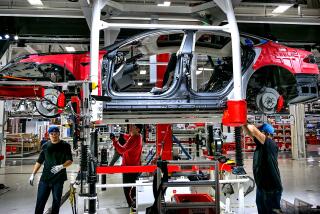International Business : Foreign Investment Helping, Castro Says : Cuba: He calls the change one of the most important made to his nation’s economy.
- Share via
HAVANA — Foreign investment is the only way Cuba can rebuild its battered economy, but this does not mean the country is up for sale, President Fidel Castro said in an interview published Wednesday.
“The opening is fairly wide. The joint ventures that are operating are working well, they have had a lot of success, and in fact, we would not have had another way out without this participation of foreign capital in the development of the country,” Castro said.
In the interview with Mexican industrialist Mario Vazquez Rana, initially published in Mexico, Castro said opening up to foreign investment has been one of the most important changes Cuba has made to its economy.
“Foreign investment is working, and we see it as an important source for development; we would not have had another alternative,” he said in the interview, published in full in Cuba in the ruling Communist Party newspaper Granma.
But he added: “We don’t want to sell the country . . . nor are we prepared to sell the country. We are doing business with factories that are stalled, factories that don’t have raw materials, factories that don’t have a market.”
The Caribbean island, plunged into crisis by the collapse of communism in the old Eastern bloc, has embarked on cautious economic liberalization over the last two years, encouraging foreign investment in almost all sectors of the economy.
Mexican firms have been key investors so far, with joint ventures in telecommunications, cement production, tourism and a project to restart an oil refinery in the central port of Cienfuegos. Companies from Spain, France, Britain, Canada and other countries are involved in sectors such as oil exploration and nickel mining.
Castro said that while private investment is open only to foreigners, this is not a deliberate exclusion of Cuban citizens but one that arose from the fact that Cubans simply did not have hard currency to invest in the sort of large projects being set up with Cuban state firms.
“There is no exclusion of Cuban citizens; it’s really their lack of resources for these enterprises that we are creating. In general, they are large businesses with many millions of dollars in investment in the imports that are needed to create them, as you have in Mexico,” Castro told Vazquez Rana.
“There is not an exclusion--it’s life, it’s reality, it’s their lack of hard currency that prevents this. . . . If a Cuban suddenly finds a treasure trove and has 5 million or 10 million dollars and wants to invest it, we could make a mixed enterprise with this Cuban citizen,” he said.
On the production of cane sugar, which has plunged from averages of about 8 million tons a year in the late 1980s to just 4 million tons in the 1993-94 harvest, Castro said the island is pushing to recover its key export.
Cuba announced last year that it was opening up the sugar industry to foreign investment and has already struck deals with some firms for financing of vital input to the sector.
Castro said the aim is to boost production to 6 million to 7 million tons a year.
Regarding the creation last October of farm markets with deregulated prices, Castro said produce taken to those markets rather than sold to the state amounted to about 20% of overall farm production. It was necessary to keep a portion for the state so it could be distributed evenly and at low prices to the public, he said.
But the proportion of goods going to the deregulated markets could rise in the future to 30% or 40% if production increased enough, Castro said. The opening of the new markets was aimed at stimulating agricultural production and has gone some way to easing food shortages among Cuba’s population of about 11 million, he said.
More to Read
Sign up for Essential California
The most important California stories and recommendations in your inbox every morning.
You may occasionally receive promotional content from the Los Angeles Times.













